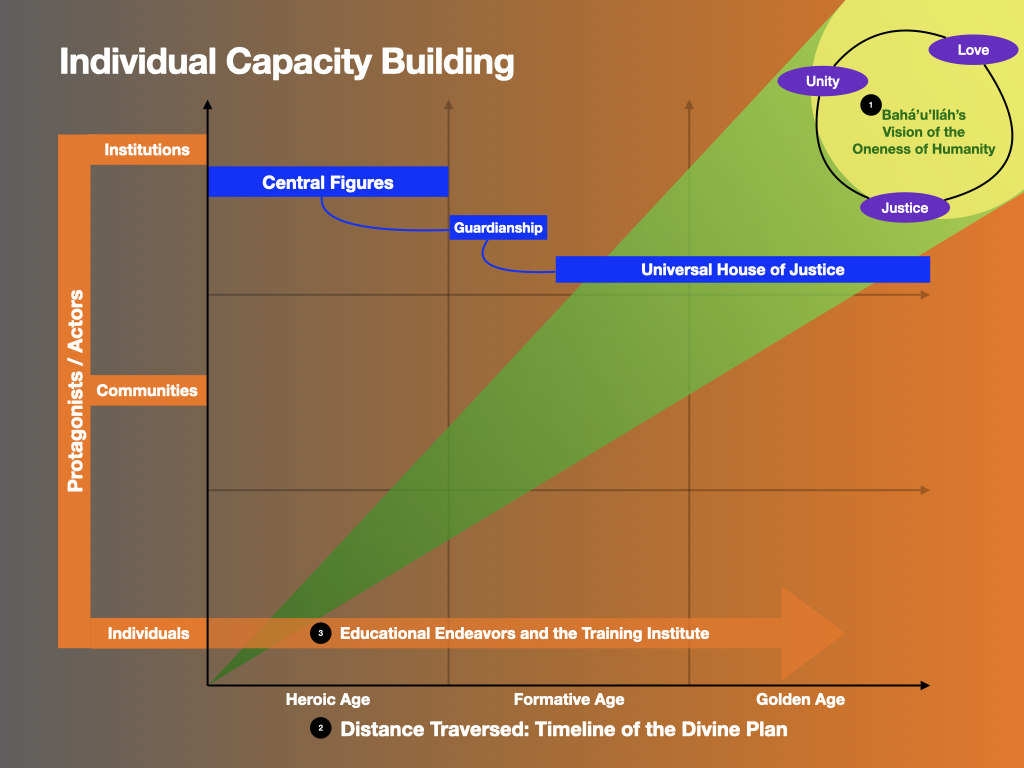15 April 2022
Istiqlál, 07 Jalál (Glory), 179 B.E
Seen
Just before sunset …

Done
The ninth slide in the presentation, Let Your Vision Be World-Embracing, underscores the critical importance of capacity building by individuals through participation in training institutes. The institute process began in the early 1990s and by the start of the first Five Year in 2001 became an established framework Bahá’í communities worldwide adopted to facilitate the spiritual education of community their members, Bahá’í and non-Bahá’í alike. Armed with that additional capacity, individuals became more confident in their capacity to serve others, more involved in their communities, and more engaged in the institutions that respond to the administrative and spiritual needs of members. Also, this capacity-building process focused on children and youth foremost in an effort to prepare the next generation to be of service in advancing the goals of the Faith for years to come. We are experiencing the success of that endeavor today two decades later.

The “Quoted” section below offers several selections that speak to different aspects of this development process.
Noted
Astral Prospecting on Instagram and Astral Prospecting on Facebook
Marc Bosserman on Instagram Marc Bosserman on Facebook, and Marc Bosserman Music and Musings on YouTube
Quoted
Of course, your successes in the teaching field and in the development of local communities will only yield lasting results if you ensure the proper education of children and youth. Youth will undoubtedly be the most enthusiastic supporters of the programs of your institutes. They are eager to make a significant contribution to the progress of their communities and have shown, time and again, their capacity to respond to the call to service. They can be trained to help shoulder the manifold responsibilities demanded by rapid expansion and consolidation. But it is especially important for large numbers of them to become capable teachers of Bahá’í children’s classes. As you are well aware, without the education of children it is impossible to maintain victories from one generation to the next. 1
Towards ensuring an orderly evolution of the community, a function of Bahá’í institutions is to organize and maintain a process of developing human resources whereby Bahá’ís, new and veteran alike, can acquire the knowledge and capacity to sustain a continuous expansion and consolidation of the community. The establishment of training institutes is critical to such effort, since they are centers through which large numbers of individuals can acquire and improve their ability to teach and administer the Faith. Their existence underscores the importance of knowledge of the Faith as a source of power for invigorating the life of the Bahá’í community and of the individuals who compose it. 2
The effects of this systematic approach to human resource development are making themselves felt in the lives of all three protagonists of the Plan—the individual believer, the institutions, and the local community. There has been an upsurge in teaching activities undertaken at the initiative of the individual. Spiritual Assemblies, Councils, and committees have grown in their ability to guide the believers in their individual and collective endeavours. And community life has flourished, even in localities long dormant, as new patterns of thought and behaviour have emerged. 3
Universal House of Justice. “Riḍván 153 – To the Followers of Bahá’u’lláh in the Andaman and Nicobar Islands, Bangladesh, India, Nepal and Sri Lanka.” Bahá’í Reference Library, Riḍván 1996.
[return]- Universal House of Justice. “Riḍván 155 – To the Bahá’ís of the World.” Bahá’í Reference Library. https://www.bahai.org/library/authoritative-texts/the-universal-house-of-justice/messages/19980421_001/1#398436350. [return]
Universal House of Justice. “26 November 1999 – To the Bahá’ís of the World.” Bahá’í Reference Library.
[return]